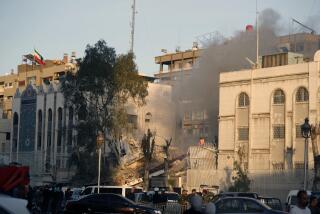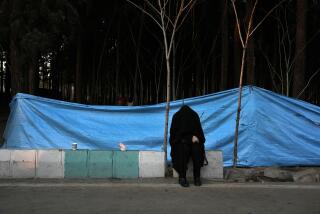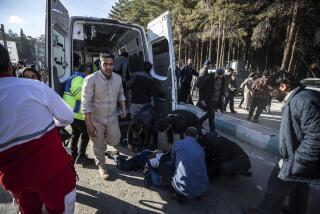Large blast kills one at Italian consulate in Cairo
A thunderous blast heavily damaged the Italian Consulate in Cairo and killed one person early Saturday, and the jihadist group Islamic State made an online claim of responsibility, hinting it might take aim at other diplomatic targets.
The attack on a foreign mission marked a departure from a pattern of strikes by Islamic militants against Egyptian military and security installations. But it was not immediately clear whether the explosion was meant to harm diplomatic personnel or merely embarrass Egypt’s security establishment.
The powerful detonation took place soon after dawn on a weekend day; the consulate was closed at the time, and relatively few people were out on nearby streets. The consulate was considerably less fortified than most foreign consulates and embassies, located close to a highway overpass, and with little setback from the street.
In its online statement, which could not be independently verified, Islamic State claimed that it had booby-trapped a parked vehicle with more than 200 pounds of explosives. It urged Muslims to “stay away from these security dens, because they are legitimate targets,” according to a transcript released by the SITE Intelligence Group, which monitors jihadist activity.
In a statement issued earlier, Italy’s foreign minister said his country would not be intimidated by any party.
The force of the blast peeled away part of the landmark building’s burnt-sienna facade and flung scorched car parts and debris over a wide area. At least four people were reported injured in addition to the single death reported by a Health Ministry official cited by the Associated Press.
The explosion raised pointed questions about militants’ ability to smuggle high explosives into the heavily policed center of the capital, despite additional vigilance ordered by President Abdel Fattah Sisi.
Sisi came to power just over two years ago when he deposed Islamist President Mohamed Morsi in a popularly supported coup, and Islamic militants carried out a concerted series of attacks clustered around the second anniversary of the military takeover. Sisi was defense minister when he led the July 2013 coup; he was subsequently elected president as part of the announced democratic transition.
Authorities were looking into a range of scenarios in Saturday’s blast, including whether an explosive device might have gone off prematurely or was intended for use elsewhere. The official Middle East news agency quoted a security official as saying the explosion might have been caused by a bomb planted under a car parked near the consulate.
Prior to Saturday’s explosion, recent attacks — like those over the past two years — had appeared to take aim at the heart of Egypt’s legal and security establishment. On June 29, Egypt’s prosecutor general, Hisham Barakat, was assassinated by a car bomb in Cairo.
Two days later, armed militants claiming allegiance to Islamic State staged a wave of strikes against Egyptian police and military positions in the northern Sinai Peninsula. Egypt’s military said 21 troops and more than 100 militants were killed in the daylong fighting, though unofficial accounts at the time suggested the military toll was at least three times higher than acknowledged by the chief military spokesman.
In the wake of the Sinai attacks, Egyptian authorities threatened to prosecute and jail journalists whose accounts of terror attacks differed from official government statements. After Saturday’s bombing, police cordoned off the area surrounding the consulate and detained several foreign photographers at the scene, though they were released within a few hours.
Other smaller-scale attacks have targeted businesses, especially those backed by foreign investment, and some tourist sites, including the pyramids and Luxor’s Karnak temple. Tourism is a mainstay of the Egyptian economy, which has been battered by turmoil since the 2011 uprising that toppled dictator Hosni Mubarak.
Islamic State had pledged that the Muslim holy month of Ramadan, which ends next week, would be a bloody one. During it, the group has claimed responsibility for an assault on a beach resort in Tunisia that left dozens of foreign tourists dead and the bombings of Shiite mosques in Kuwait and Yemen that killed scores more.
Twitter: @laurakingLAT
More to Read
Start your day right
Sign up for Essential California for news, features and recommendations from the L.A. Times and beyond in your inbox six days a week.
You may occasionally receive promotional content from the Los Angeles Times.






